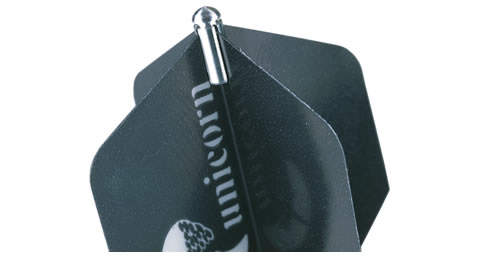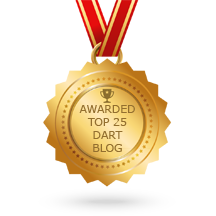Darts is a game of skill which has become a professional competitive sport throughout the world. Overall the game can be described as a sport that involves throwing miniature javelins to a board that measures 451mm in diameter. The board is divided into radial sections which determine the scoring system.

Success in this game is not only determined by skill but it is also determined by the type of equipment used as well as knowing how to use it and understanding its basic maintenance. The following is a rundown of some essential dart equipment;
Dart Flights
A dart flight is the feature located at the tail end of a dart, which is responsible for directing the projectile of a dart when thrown towards the board. It is important to make sure that your dart flights suit your throwing skills i.e. the standard shape allows for a downward curving throw whilst the slimmer shaped flights are perfect for straight high speed throws. The rules of the game require you to maintain the same flight shape for all your 3 darts.
Dart flights are made of a wide range of materials. However, the most important thing to take note of is that your flights always have to be kept evenly spaced and not allowing them to become flat. This is very important because it ensures that your flights always maintain a consistent dart flight.
Dart flight protectors
There is also dart equipment which some people or some dart players may think they can do without and these are dart flight protectors. These flight protectors are very small and are placed at the end of your dart’s flight. The role of this equipment is to protect the flight from being damaged or ripped into half by an incoming dart. The protector also helps in making sure that your flight stays evenly spread out at all times. Therefore flight protectors are important because they help prevent damage to your flights, which saves you money and they help in stabilizing the flight path of your darts.
Dart shafts/stems
The shaft also known as the stem is the elongated part of the dart which connects the dart point and dart flight. Stems also play an important role in determining the flight pattern of your darts. Dart stems are made of various materials among which include nylon, brass, tungsten steel, aluminium and titanium. The stems made of nylon are rather fragile as they break when dropped. The aluminium stems tend to bend but they are light weight allowing for the bend in a throw. Other materials used are a bit heavy with high durability allowing for the much aggressive kind of throws.
Dart Tips
Dart tips are the part of the dart which pierces the board when a dart is thrown. The condition of your dart tips is very important for it determines whether your dart will stick on the board or just bounce off. There are several materials used for dart tips ranging from soft metals to steel. Depending on the kind of darts you have, some allow for replacement of dart tips whilst some are not removable. Removable dart tips allow you to keep the dart tips in top condition by replacing blunt tips. The only option you will have with fixed tips is to sharpen them. However, if they do bend you may have to replace your set of darts with a new set.
Dart Sharpeners
Since keeping your darts is very important, dart sharpeners are also sold as part of your darts equipment. Dart sharpeners will ensure that your dart points are kept sharp at all times hence reducing bounce. It is also important to remember that by reducing bounce you will also be able to protect your equipment from damage through falling, hence saving yourself some extra cash.
Dartboards
Dartboards have really come a long way. In ancient times there used to be clay boards and some made of solid wood. These kinds of boards soon became phased out bringing the latest models which require little maintenance. Latest dartboards are made of materials such as sisal fibers, cork and coiled paper. These materials allow the dartboard to resist damage from dart points thus allowing for uninterrupted play.





